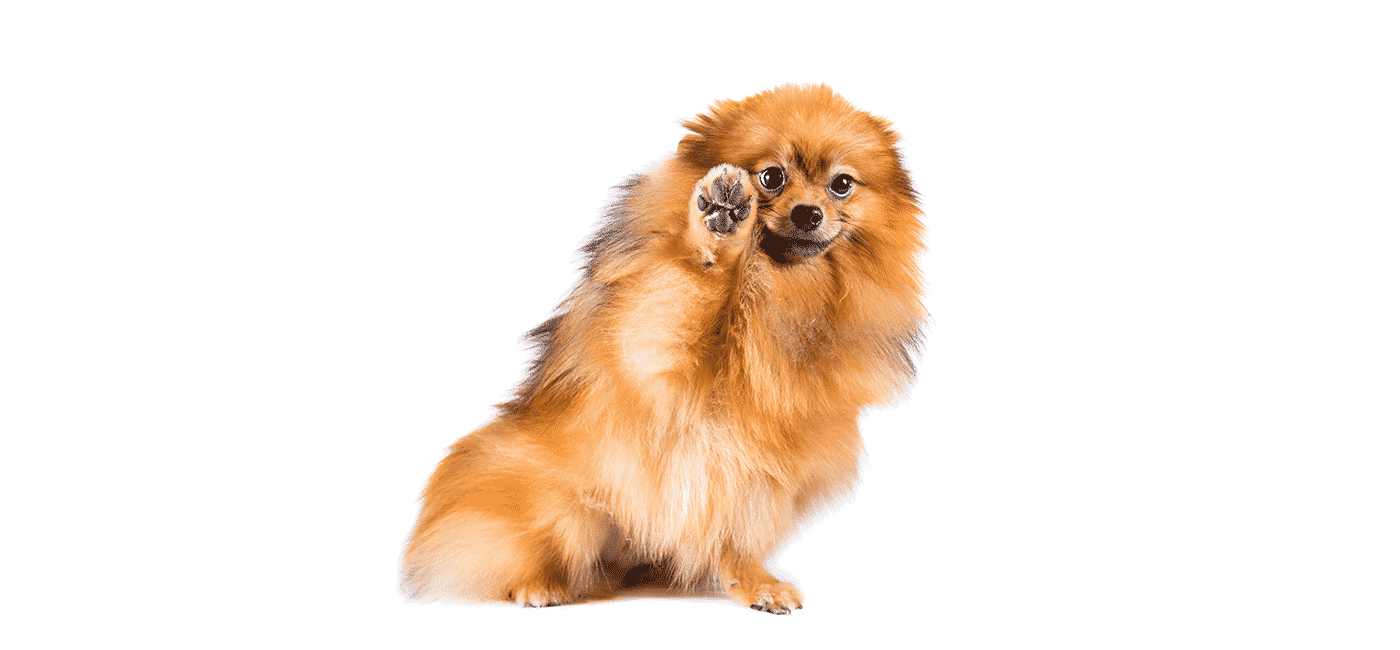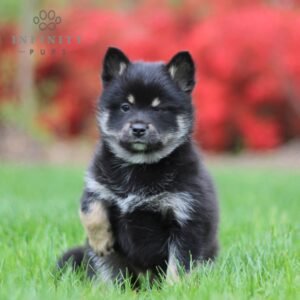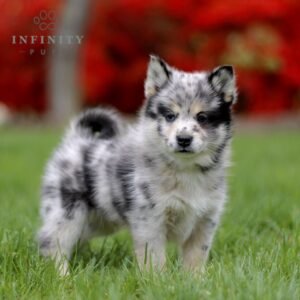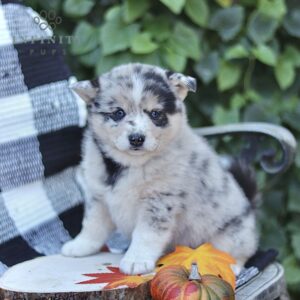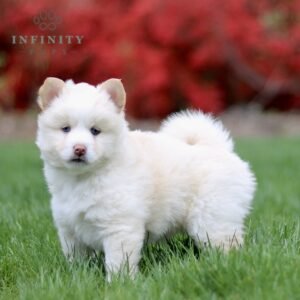Sorry, no puppies of this breed are currently available. Contact us to be notified when more are listed for adoption.
Have a question about our Pomeranian puppies?
"*" indicates required fields
overview of the Pomeranian Dog Breed
Are you looking for a tiny dog with a big heart? Do you want a family pet that is easily trained, loves human interaction, and has a beautiful coat with color?
If this is what you want in a dog, then check out our Pomeranian puppies for sale!
Known to be one of the smallest dog breeds, Pomeranian dogs are popular for the way they interact with children, master tricks and games with their intelligence, and their thorough love for humans.
If you are looking for a small dog but don’t want to give up any “big dog” heart or character, then purchase your Pomeranian puppy today!
You can also browse our other available dog breeds on our “all breeds” page.
Pomeranian temperament
Lively: Pomeranian dogs are active and love to play and interact with humans. They do well with children, but caution needs to be taken due to their small size. They can easily be exercised both indoors and outdoors.
Energetic: Pomeranians are lively and energetic dogs that enjoy playtime and exercise. They may have bursts of high energy and enjoy interactive games.
Independent: Pomeranians can have an independent streak and may not always want to follow commands if they’re not in the mood. However, positive and consistent training can help manage this trait.
Intelligent: They are an intelligent breed and can be taught most things quickly and easily. They are especially known for their love of learning tricks and playing games.
Inquisitive: Pomeranians are an independent, outgoing breed. Even though they are small, they are very curious about their surroundings and new things that appear.
Bold: They may be small, but they don’t let that fact get in the way! Sometimes called “the little dog who thinks he can,” the Pomeranian breed does not let their small size intimidate themselves.
Alert: Pomeranians are very alert and sensitive when it comes to new surroundings or unusual events. They have a loud bark and make excellent watchdogs, even if they are not as dangerous as larger dogs.
It’s important to note that individual Pomeranians can vary in temperament based on genetics, socialization, and upbringing. Early socialization, training, and consistent care are key to raising a well-behaved and happy Pomeranian.
Pomeranian Breed history
The Pomeranian breed has its roots in the region of Northern Europe, close to the Baltic Sea, called Pomerania. The breed is the smallest cousin to the larger Spitz breeds used as sled dogs in the Arctic.
Several hundred years ago, the Pomeranian was developed from these larger sled dogs, and the breed continued to evolve until it became the small size that it is today.
Queen Victoria from England is often credited as making the Pomeranian breed famous. While visiting Europe in 1888, she saw a Pomeranian dog and fell in love with it. After bringing one back to England with her, the popularity of the breed significantly increased.
In fact, it is reported that her favorite Pomeranian, Turi, was present at Queen Victoria’s bedside when she died in 1901.
The United States fell in love with Pomeranian soon after England did, and the first Pomeranian specialty show was held in 1911.
A few breeds similar to the Pomeranian include the Bichon Frise, Maltese, and Shetland Sheepdog.
Pomeranian Average size
Pomeranians are one of the smallest dog breeds.
They reach 6-8 inches at the shoulder, and the average weight is 3-7 pounds.
Average Pomeranian lifespan
Pomeranians have an average life span of 12-16 years, one of the longer lifespans for dog breeds.
Pomeranian body features
The Pomeranian breed is known for its two distinctive physical features.
First, its face has a distinctive foxy look.
Second, they have a double coat with a frill that extends over the chest and shoulders.
Pomeranians come in almost two dozen colors, and each dog has unique patterns and markings. The most common variation is an orange or red coat with white and black markings.
grooming Your Pomeranian Puppy
The Pomeranian’s distinct look is its full, lush coat. However, because it is a thick double coat, it does require more care than some breeds. Thankfully the dog’s small size makes grooming relatively easy.
The coat should be brushed daily with a pin brush, and also brushed weekly with a slicker brush. Without hurting the dog, make sure you are able to brush down to the skin with the slicker brush.
It is recommended that you bath Pomeranians every couple of months. It is also good to do a full groom every 4-6 weeks; including bath, brushing, ears, nails, and anal glands.
Keeping Your Pomeranian Puppy Healthy
The Pomeranian breed is an overall healthy breed. In fact, one of the biggest concerns with the Pomeranian is its small size.
Because it is so tiny but loves human interaction, it can be easy for small children to harm Pomeranian dogs. If you have small children, it is important to teach them how to interact safely with the dog. It is also good to monitor closely the first several times your child interacts with your Pomeranian.
Like all dog breeds, Pomeranians are susceptible to hip and elbow dysplasia, two of the most common health issues among dogs. Hip and elbow dysplasia occurs when the leg or hip becomes weakened, and it can result in arthritis or lameness if not addressed.
One of the best ways to prevent this is by keeping your dog from excessive running on hard surfaces. This is especially vital when they are a puppy.
Typical Pomeranian Allergens
Pomeranians are an interesting breed when it comes to discussing allergens. Their thick double-coat does release a lot of hair, but because they are so small, they don’t release a lot of loose hair IF they are brushed daily.
However, it is also important to understand what causes allergens in the first place.
Allergens are caused by dander, which is dead skin cells. These skin cells are shed by any animal, including humans.
It is important to know if you have someone in your household who has a concern with pet allergens. While daily grooming helps, there are also some medications that can help prevent allergic reactions to pet dander.
Either way, regular grooming and cleaning reduce the allergens that your Pomeranian releases, especially if you start as a puppy and it becomes a routine in your schedule.
- 1. Looks like a pretty fluffy pup. Are Pomeranians hard to groom?The coat looks intimidating, but it isn’t as bad as you think. Pomeranians do require regular brushing to prevent matting and tangling, and occasional trips to the groomer are recommended. But you won’t need to spend multiple hours a day grooming your Pom, especially if you keep him indoors where he won’t get dirty.
- 2. I like visitors. Are Pomeranians friendly to strangers?Pomeranians tend to be reserved and perhaps a bit suspicious of strangers. However, they don’t tend to be aggressive. A Pom who has been well-socialized during her puppyhood will be much more socially well-adjusted than a puppy who never got adequate socialization. With proper training and socialization, Poms do just fine with visitors.
- 3. Will a Pomeranian get along with my cat and other dog?Yes – Poms tend to coexist quite peaceably with cats, dogs, and other pets, especially if they have grown up together. Your Pom probably won’t have any trouble standing up for himself. Poms often forget how small they are and take on foes much larger than themselves! If anything, you may have to protect your other pets from your Pom’s selfish tendencies.
- 4. I’ve never owned a dog before. Is a Pomeranian a good choice for me?Yup! Pomeranians make great first-time dogs. With their sweet temperaments, intelligence, and manageable size, they are pretty easy to handle.
- 5. I have a hamster and a parakeet. Will a Pomeranian eat them for lunch?All dogs like to chase small, fluffy, squeaking things like hamsters and parakeets. That means you’ll have to teach your Pomeranian that her food is in her dish and NOT in the birdcage or hamster run. However, a Pom won’t pose as deadly a threat to your other pets as some breeds, such as a spaniel or other hunting breeds.
- 6. Are Pomeranians difficult to train? Are they stubborn?All dogs have the potential to have a stubborn personality, and the Pomeranian is no exception. In particular, housetraining can be a little difficult. However, this breed is smart and quick, and with time, consistency, and commitment, they are easily trained. How stubborn your pup is depends on his individual personality.
- 7. Do Pomeranians pick a favorite person?Pomeranians LOVE human interaction, and they often choose one special person to especially dote on. They may dislike being separated from this special person they choose. However, while it is true that they often pick a favorite person, they can be a good choice for busier folks because they don’t tend to be an overly dependent breed.
- 8. Do Pomeranians get too hot with all that fluffy hair?Yes, Pomeranians are susceptible to heat stroke when exposed to high heat and humidity. These pups will appreciate a climate-controlled environment during the summer, and you should watch carefully for signs of overheating when taking walks in warm weather.
- 9. Is a Pomeranian going to shed hair all over my house?Pomeranians shed moderately. You probably will find some hair, but not an excessive amount. Brushing your Pom regularly will help keep the shedding down to a minimum. And here’s a fun fact: Poms can actually develop bald spots in their old age!
- 10. Will my Pomeranian annoy my downstairs neighbors with constant barking?Pomeranians have surprisingly loud voices for their small size, and they like to use them. They make great watchdogs because they’ll bark at every new thing they see or think they see, but it might be a good idea to teach them to stop barking on command if you have downstairs neighbors. Of course, barking levels depend on individual personality. But Poms tend to be more vocal than some breeds.

